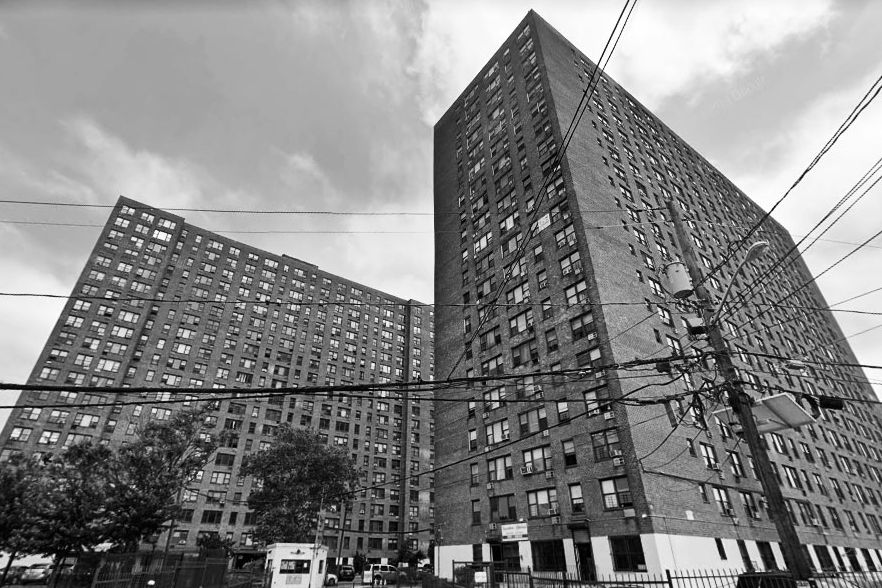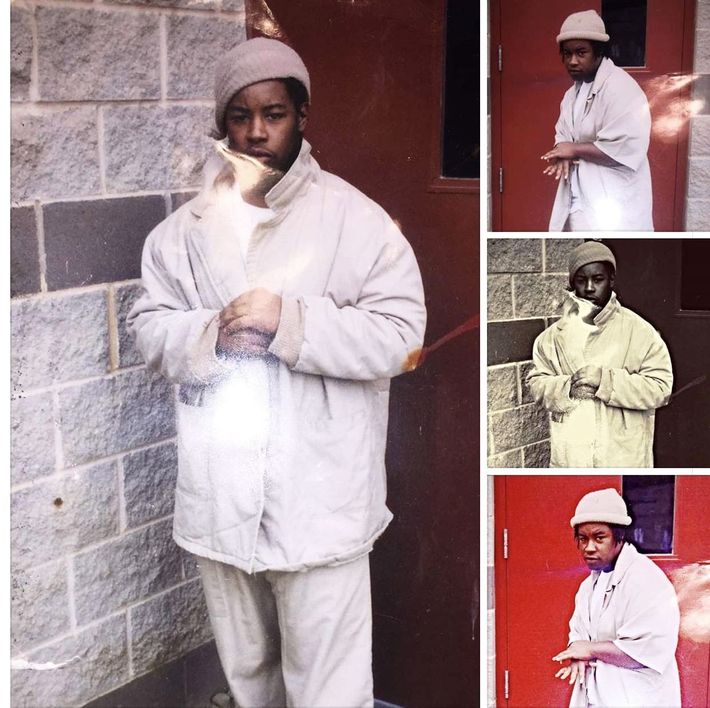He would be called a murderer and a domestic terrorist.
But to us, he was family.
Our struggles with systemic racism were the same.

Save this article to read it later.
Find this story in your accountsSaved for Latersection.
Its a crisp sunny day on Myrtle Avenue in Irvington, New Jersey.

Summer is slowly winding down, and school starts in a few weeks.
The birds chirp harmoniously like Bone Thugs.
All seems right with the world.
Then, a loud gunshot.
Screams ring out across the neighborhood.
People run for their lives, panicking.
The man aims his rifle at a neighbor of almost 30 years, calmly pulling the trigger.
She narrowly evades death.
He walks a couple more feet before reaching our childhood home a home his grandfather owned.
He walks through a side corridor connected to the back of the house and patiently reloads his rifle.
Sirens blare as cops close in.
After today, the man will be called a murderer, a mass shooter, and a domestic terrorist.
However, back when we met him in the 1980s, he was just Kaizen Crossen.
We called him cousin, but he was more like a big brother to us.
Oddly enough, there were no gardens in the ghetto.
Just concrete, rats, and shitty elevators.
LBJ was hoping to combat indigence by providing affordable housing to the working poor.
At first, things looked promising.
The dealers catered to them with a speed and efficiency that would have made McDonalds jealous.
In 1999, I did a hunger strike @ Garden Spires.
The then mayor promised but never built a park 4 residents.
Many people died during this war.
It was in this precarious environment that we bonded with Kaizen, a fellow bastard of Newark.
Kaizens mom was addicted to drugs, and his father bailed when he was a baby.
Our mom dated his uncle for a moment, which brought us into close contact with his family.
He would babysit us when our mom had to work her second job at a liquor store.
Strangely, Kaizen wasnt the only eventual murderer to babysit us.
Nevertheless, they were exceptional babysitters.
Uncle Keith got arrested after a shootout with cops in Virginia.
We attended his marriage to our Aunt Cathy in prison.
Despite the location, it was a beautiful wedding.
But, we digress.
Our fortunes changed in 1992 because Bill Clinton got elected.
Just kidding, that dude was terrible for poor black communities.
His policies locked up more brothers than Kawhi Leonard in the playoffs.
We were able to move because our mom got a new job at the VA Hospital.
It was a safer neighborhood than the Spires, and only occasionally called Murder Ave by the locals.
Kaizens great-grandfather, a man we all affectionately called Granddaddy, owned the house where we lived.
He was a WWII vet and an all-around swell guy who loved watching old-school wrestling.
We moved into a one-room attic apartment on the third floor with our mom.
After the move, we spent even more time with Kaizen and the Crossen family.
Wed throw BBQs and play pick-up basketball and a game called man-hunt.
All of the young boys in our neighborhood looked up to him.
He was extremely charismatic, intelligent, and the life of any party.
He was also a gifted joke-teller with an uncanny ability to mimic others.
As the oldest among us, he was the leader of the block.
And he led with zero fear.
One summer, our bike got stolen by a neighborhood bully.
We cried and ran to Kaizen, who didnt hesitate to go searching for the bike.
After a couple of hours, he triumphantly returned with the bike and made sure to beat the bully.
No one ever stole our bikes again.
For Kaizen, if you messed with one of us, you messed with him.
And he was willing to defend us, since none of our dads were around.
It was 1995, and he had just purchased gold fronts for his teeth.
For an entire day, we debated which was the better group: Wu-Tang or Bone Thugs?
Kaizen would not budge.
We went back and forth, asking everyone on the block who they thought was better.
Most of the women and children preferred Bone Thugs, while most of the young guys preferred Wu-Tang.
In general, logic and evidence should win debates, but in the hood, guns trump both.
From fourth to sixth grade, we moved between Irvington and Newark.
Unfortunately, Kaizen did not have a similar opportunity.
He stayed in Irvington and Newark, finished high school, and gradually became involved in criminal activity.
In 1998, he was arrested for selling weed in a school zone.
While Kaizen struggled with the law, we continued to succeed in school.
At TCNJ, we studied philosophy.
We also started listening to too much Radiohead.
Uncle Al jumped to his death from a high-rise building in Newark during our sophomore year.
His death fundamentally altered our perception, making us more morose and sullen.
Philosophy enabled us to assess our material conditions logically.
But this intellectual understanding did not address our emotional distress.
You cannot rationalize away pain and trauma.
People dont like to talk about mental health.
Back in Newark, there was a stigma against folks who openly acknowledged struggling with it.
Specifically, they would be stigmatized as crazy motherfuckers.
No one wanted to be deemed mad.
So instead of talking about our emotional distress, we adopted strategies to cope.
People have different ways of rationalizing disturbing thoughts.
In college, we turned to philosophy and sports.
Kaizen preferred violence, drugs, and alcohol.
None of us saw a psychotherapist.
We couldnt afford it.
This isnt just an issue in the hood.
Its pervasive throughout society.
At Duke and NYU law school, we saw firsthand how the elites treated their mental health issues.
Our classmates heeded a strict code of silence to avoid being perceived as weak in such a competitive environment.
Nevertheless, a significant number of them suffered from severe mental health issues and abused substances.
A few of our classmates even committed suicide.
In fact, we know more people who committed suicide from law school than from the inner city.
We started recognizing the hypocritical, often absurd, duality of our legal system.
Whites create, interpret, and enforce the law.
Those who violate the law are deemed criminals fair enough.
Whites and blacks use drugs at similar rates.
Yet somehow blacks are arrested at disproportionately higher rates for the use and distribution of drugs.
How is that possible?
Its only possible if black criminality is embedded in the premise of our robust legal system.
So he sold weed, which wasnt yet a perfectly legal, billion-dollar industry.
Instead of therapy, we sought fame and fortune to mask our pain.
But our PTSD remained untreated.
So, we continued to self-medicate with drugs and alcohol.
We were spiraling out of control, seeking to destroy ourselves.
After a particularly bad night with drugs and alcohol, we decided to try sobriety.
Our ACE score was 8 out of 10.
There are many ways to commit suicide.
Kaizen would talk about going out like Scarface.
Most in the family thought he was probably interpreting rap lyrics too literally.
The final time we saw Kaizen was on May 3, 2019, a few months before his death.
We were performing a stand-up comedy show in Newark in front of our family.
We hadnt been back in a few years.
We did a 30-minute set, touching on issues such as drug abuse, ending gentrification, and suicide.
Deciding whether or not life is worth living is to answer the fundamental question in philosophy.
All other questions follow from that.
We chilled with Uncle Keith, our homegirl, and Kaizen for a few more hours.
And then things got weird.
Kaizen asked us to go someplace else to have a foursome with our friend.
We werent sure if he was joking or not, but we declined.
Thankfully there was no shootout.
At around midnight, we hugged our cousin, telling him we loved him and wed see him soon.
Then he walked away into the darkness.
It would be the last time we ever saw him alive.
His car was out of service, and he needed a ride to the shelter to get food.
Not the stainless-steel 9mm from two decades ago, but a military-grade rifle filled with ammo.
He put on a bulletproof vest and walked back down the street to kill the two guys.
Kaizen subsequently shot at everyone in sight, including neighbors hed known for three decades.
A cop showed up, and he shot the officer in the legs.
He taunted the police every step of the way, daring them to shoot him.
For a moment, everything went still as he bled out, inching closer to death.
The bullets stopped as the cops secured the perimeter around the house.
What were his final thoughts when he died?
Maybe he thought about his baby brother?
Kaizen committed a heinous crime, but his actions dont exist in a vacuum.
He sold weed to make ends meet.
They create a false dichotomy where youre either a perpetrator or a victim.
This is the underlying premise of America.